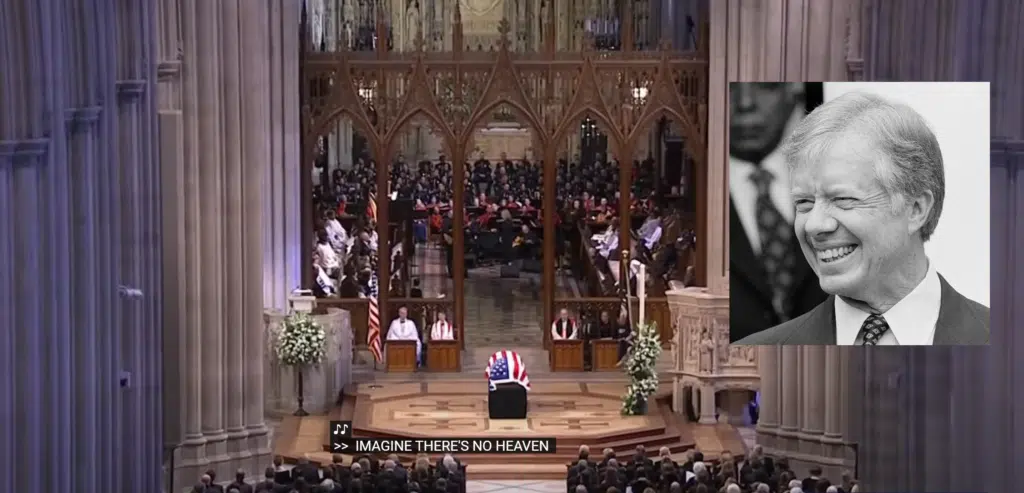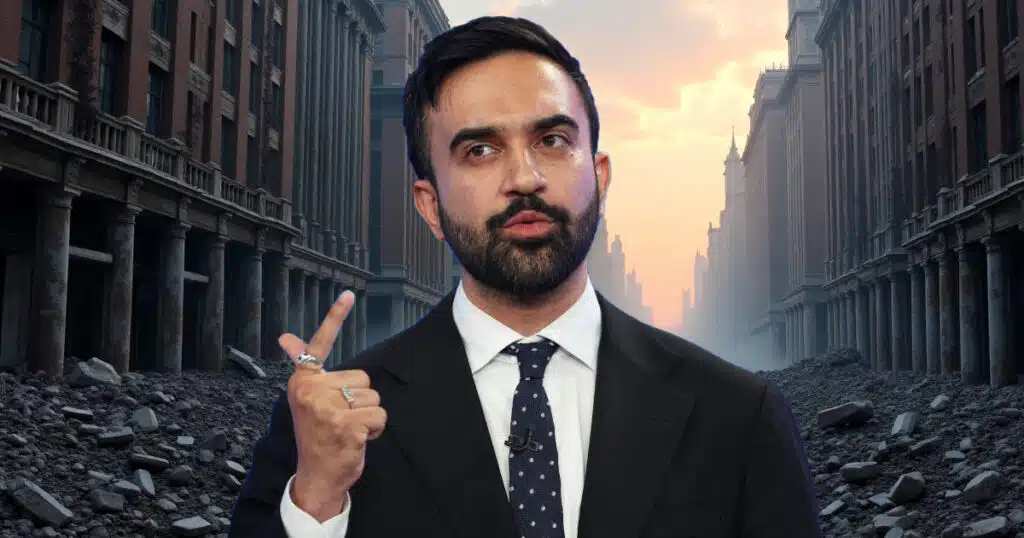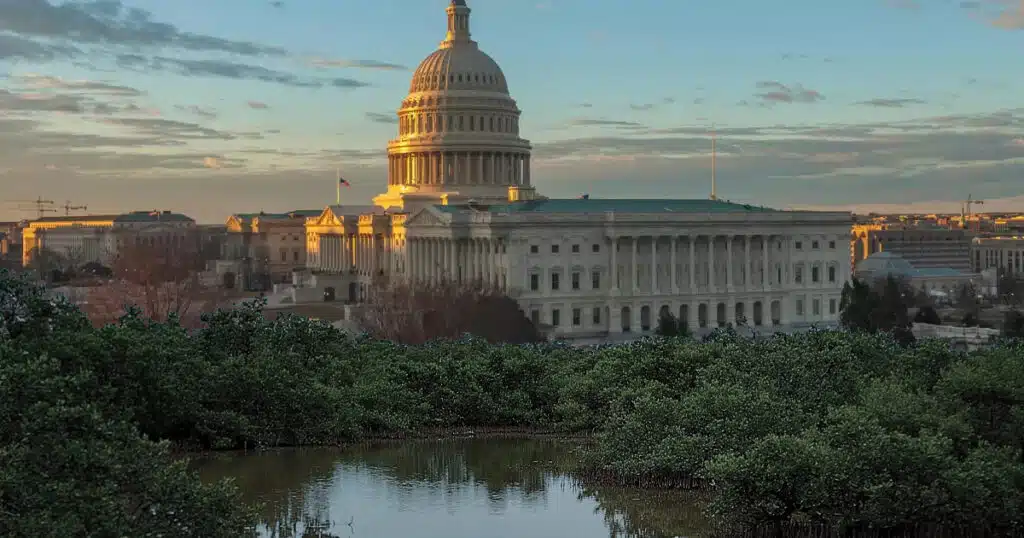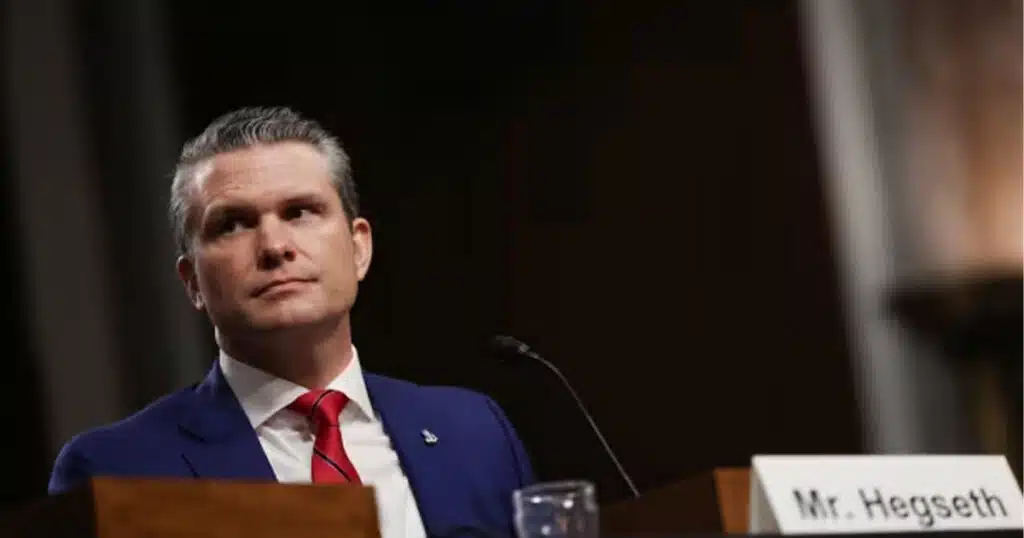
Jimmy Carter Funeral Attendees Urged To ‘Imagine There’s No Heaven’
Most of the commentary today is focused on who dissed who in the pew.
Yet the funeral of President Jimmy Carter gave us some reminders of the often enigmatic beliefs of the 39th Commander in Chief but also his ability to play both sides of various aisles.
The former president died Dec. 29, 2024, at age 100, after a lengthy battle with cancer.
Today’s National Cathedral service also lifted the veil off simplistic labels often attached to Carter, such as a “born again Evangelical” or “Bible-believing” Baptist — at least according to our definitions of those terms today. He was a moderate or “Jimmy Carter Baptist.” This factored in heavily into his presidency as well as his left-of-center politics throughout life.
The most flagrant reminder of his theological leanings this morning was Garth Brooks and Tricia Yearwood singing a rendition of “Imagine” by John Lennon, a reprise from Rosalynn Carter‘s funeral in 2023, and reportedly one of the late president’s favorite songs.
“Imagine there’s no heaven
It’s easy if you try
No hell below us
Above us, only sky”
(Start around 2:42:00)
This was sung amid hymns picturing life in the hereafter. No, you don’t hear that former Beatle ballad sung in many funerals for Baptists.
All song lyric interpretations aside, much can be said about Carter’s good and Christian intentions, which was on full display today at the National Cathedral in Washington D.C. Humble. Peacemaker. Habitat volunteer. Sunday School teacher. Grandpa. And, as President Joe Biden eulogized, often accused of being from a bygone era of Southern Democrats but a “prophet” of liberalism who “saw into the future” and pushed for environmental reforms such as the formation of the Department of Energy and social entitlements like WIC.
Following the funeral at the National Cathedral, the motorcade is expected to arrive in Plains, Georgia, this afternoon for a private church service and burial. Maranatha Baptist Church, Carter’s home church, with whom he taught a very popular Sunday School until his ailing years, will host the final service on an unseasonably cold day in the South. Carter’s Sunday School class was so popular you had to buy tickets to it in advance — now taught by his niece.
It’s at this fact observers often point to Carter as a “decent” Baptist, or one who stood firmly on the Bible without all the dreaded right-wing proclivities. It was this public perception that gave him the edge over Gerald Ford in the 1976 election, but it was soon revealed to be a strange flux that did not settle well with either the D.C. establishment or 1980 voters. And on an economic note, even his conservative-ish efforts at cutting the deficit and zero-based budgeting seemed to result in more government growth overall.
Carter’s church may have started out in the same conservative and biblically literal Southern Baptist pool as the rest of the nation’s largest Protestant denomination. The country church was founded in 1977 after leaving the historic Plains Baptist Church over racial issues. In the 1990s, when conservatives across the denomination took a bold stand against abortion, for traditional gender roles, and the inspiration of Scripture, the “moderate” faction faced overwhelming defeat. Many of these moderate Baptists walked to form their own denominations or join other, smaller Baptist alliances. It’s in many ways opposite of a rift among United Methodist Churches currently and a reawakening of foundational principles, which has a sizeable minority of traditionalists leaving for more conservative pastures.
Though not a large chunk of Baptist life in America, the Cooperative Baptist Fellowship (CBF) is the body to which Carter’s Maranatha Baptist Church later aligned according to sources. CBF claims 1,800 churches and 750,000 members, as compared to Southern Baptist Convention’s (SBC) 50,000 congregations and 13.2 million members.
Carter joined CBF in 2000, announcing that he was no longer a Southern Baptist as an individual. (This was something fellow liberal and Southern Baptist Bill Clinton did silently if he still went to church at all.)
That’s not to say the CBF is a solidly liberal gathering of churches. Though they embrace women in the pulpit (unlike the SBC) and make a big show of racial reconciliation, they claim the SBC has put too much power into boards and commissions. CBF churches pride themselves of their Baptist heritage of congregational independence and the Baptist notion of “separation of church and state.” There are a fair number of conservative congregations who are aligned with the CBF for their own reasons. Maranatha Baptist in Plains is not one of them. And neither was Carter.
Numerous left-leaning legacy media sites positioned Carter as a man who tried to “save” the Southern Baptists through backing many alternative conferences and organizations. A large meeting of disaffected Baptists gathered in Birmingham after the formation of the CBF in the early ’90s, with Carter as the keynote. He recalled during this address an Oval Office meeting toward the end of his presidency with Southern Baptist convention president Adrian Rogers, a known Evangelical heavyweight.
“I was proud to meet with the president of my convention,” Carter recalled. “He [Rogers] said, ‘Mr. President, I hope you’ve given up your secular humanism and become a Christian again.’ I thought I was still a Christian.”
Carter said that nearly every issue — women’s rights, abortion, SALT II arms reduction negotiations, and the organization of the Department of Education — “was viewed as a religious litmus test by Southern Baptist Convention leaders during his term.”
This was during a time when many of the faithful were justifiably worried about the consequences of radical feminism and the breakup of the American family, the infanticidal consequences of Roe v. Wade, the threat growing Communist world powers, and the erosion of the quality of a public school education.
Carter, though obviously on the left side of that divide, hoped for cooperation with conservatives on issues ranging from efforts to provide clean water in impoverished Third World nations to combatting human trafficking. See an excellent review here via the late GotReligion blog and podcast page.
“Even though [Carter’s] arrival as a centrist Southern Democrat was important, he has continued to evolve toward more progressive positions on moral and social issues (like his party), but not to the same degree,” wrote religion columnist Terry Mattingly.
Carter indeed “evolved” (his own word) on issues such as gay rights and Palestinian statehood. His dying wish was casting a vote for Kamala Harris, while many other Southern Democrats had long since left for the GOP.
“I believe that God loved the world so much that He gave His only begotten Son,” Carter said in his interview with conservative stalwart and Southern Baptist Theological Seminary president Albert Mohler. “I believe those things, but I know that there are some things as a scientist — my background is in nuclear physics — there’re some things that weren’t understood by the writers of the Bible. I just ignored those discrepancies as insignificant.”
The first part of that statement makes Carter an Evangelical Christian by most definitions of the term. But that second part makes him a Baptist “moderate.” It’s that perspective which gives Carter plenty of latitude on issues addressed more specifically in the non-red letters of Scripture: from sexuality to gun control.
From that same interview:
“Mohler: The Bible contains many things that, quite honestly, rub up against the sensitivities of a modern age and require all of us to think about how we’re going to apply the eternal truth of the Scriptures to some of the most pressing and current controversies. The controversies over human sexuality have been an issue. Even in just recent days, you’ve been kind of in the headlines on that issue. What do you think about the Bible’s normative statements about human sexuality? How should we interpret those and apply those in the modern age?
“Carter: Well I have to admit, Dr. Mohler, that I’m kind of selective on that point of view. I really turn almost exclusively to the teachings of Jesus Christ, who never mentioned homosexuality at all as a sin. He never condemned homosexuals and so I don’t condemn homosexuals. And our church, our little church in Plains, we don’t ask, when people come to join our church, if they’re gay or not. We don’t ordain, we don’t practice marriage between gay couples in our church, but that’s a Baptist privilege of autonomy of local churches. I’m against any sort of government law, either state or national, that would force churches to perform marriage between gay people, but I have no objection to civil ceremonies. And so, I know that Paul condemns homosexuality, as he did some other things like selfishness that everybody’s guilty of, and so I believe that Jesus reached out to people who were outcast, who were condemned, brought them in as equals and I also pretty well rely on Paul’s writing to the Galatians that everyone is equal in the eye’s of God and we’re treated with compassion. And I personally believe, maybe contrary to many of your listeners, that homosexuality is ingrained in a person’s character and is not something they adopt and can abandon at will. So I know that what I’ve just explained to you might be somewhat controversial, but it’s the way I feel.”
De mortuis nil nisi bonum. Speak no evil of the dead, in other words, and we owe it to Carter to lend him the benefit of the doubt where there is any. From two disparate voices on the right who many have disagreed with his national and ecclesiastic politics:
Given: State funerals are not often the place for hard preaching but civic religiosity as a nation mourns. For example, during the last presidential funeral, we were told how George H.W. Bush “did not die … yet he lives,” among other questionable statements supporting a relativistic view on salvation. Again, not the place to split theological hairs or delve deeply into subjects of life and death.
We can hope the Maranatha Baptist pulpit will honor the Bible and the Gospel. The local church’s statement on Carter’s passing quotes II Corinthians 5:8: “… to be absent from the body” is “to be at home with the Lord.”
Rest in peace, President Carter. We hope to see you in heaven, even if we were told today in song not to Imagine that possibility.



